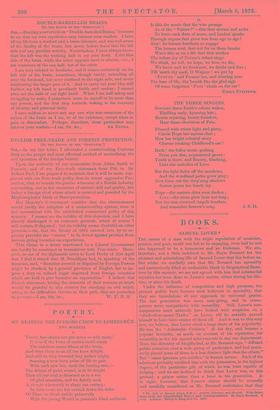ENGLISH FREE-TRADE AND FOREIGN PROTECTION.
(TO THE EDITOR OF THE "SPECTATOR."]
SIR,—In my last letter, I advocated a countervailing Customs duty as the proper and most effectual method of neutralising the evil operation of the foreign bounty.
Upon the authority of our economists from Adam Smith to Fawcett, and of our Free-trade statesmen from Pitt to Sir Robert Peel, I am prepared to maintain that it will be more con- sistent with our Free-trade policy thus to arrest aggressive Pro- tection, than to remain the passive witnesses of a British industry succumbing, not in fair encounter of natural skill and quality, but before a foreign rival whose attack is secured and guarded by the Mephistopheles' blade of State-protection.
Her Majesty's Government consider that the circumstances would justify the adoption of a countervailing system, were it not inconsistent with the established commercial policy of this country. I cannot see the validity of this objection, and I have already challenged it on economic grounds, which of course I will sustain, if disputed ; but its validity seems doubtful on other grounds,—viz., that the Treaty of 1864 entered into by us ex- pressly provides the " surtax " to be levied against produce from nations giving bounties on exportation.
This clause in a treaty sanctioned by a Liberal Government can hardly be construed as inconsistent with Free-trade. More- over, in one of the diplomatic notes to Lord Derby of 21st April last, I find it stated that M. Deseilligny had, in speaking of the bounties, said, "Bounties avowed or disguised by Foreign Powers might be checked, by a general provision of English law to im- pose a duty on refined sugar imported from foreign countries which are held to give bounties on exportation." I believe that French statesmen, having the interests of their revenue at heart, would be grateful to this country for checking an evil which, owing to the difficulties thrown in their path, they are powerless


































 Previous page
Previous page